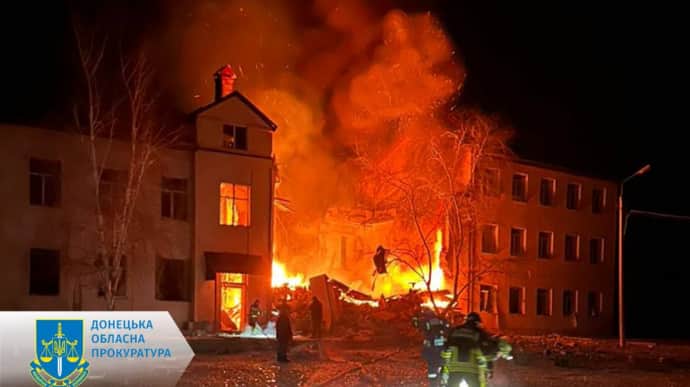Daily Flyer - February 18, 2024
A voice of Ukraine to the West

The future of Ukraine without US aid
Bloomberg described the future of Ukraine in case of termination of US aid.
An article by Bloomberg Opinion columnist and Henry Kissinger Professor Emeritus at the Johns Hopkins University School of Advanced International Studies, Gale Brands, warns of serious and global consequences if the United States does not unblock aid to Ukraine. Brands believes that such a move would undermine American politics for years to come and lead to disastrous, large-scale consequences.
According to the article, if the US stops supporting Ukraine, no other entity is likely to provide military aid in the same volume. While Europe can offer financial aid, it lacks the capacity to supply the combat equipment urgently needed by Ukraine. The consequences of halted aid could quickly accumulate, affecting Ukraine's military capabilities.
The author highlights the strategic importance of aid to Ukraine, stating that its defeat would have severe repercussions. It could lead to increased instability in Europe, with a militarily mobilized Russia posing threats to NATO's eastern front. Additionally, it might raise global pressure on nuclear proliferation, as countries like Poland, South Korea, and Japan may view nuclear weapons as their primary means of security and survival. The article also warns of the potential erosion of post-1945 norms against forcible seizure and annexation of territory, returning the world to a state of brutal anarchy.
The article concludes by noting that the United States currently allocates only 5-6% of its annual defense budget to military aid for Ukraine, and a retreat from such support would be considered a significant and avoidable mistake in the history of US foreign policy.
Russia could replicate Avdiivka's capture tactics if West continues to delay aid
The Institute for the Study of War (ISW) has raised concerns that Russia could replicate its successful tactics in Avdiivka on a larger scale if the West continues to delay military assistance to Ukraine. According to the ISW report, Russian forces secured air superiority during the Avdiivka offensive, and Western delays have hindered Ukraine's air defense capabilities.
The ISW notes that Russia's success in Avdiivka was partly due to localized air superiority and a new tactic of launching mass glide bomb attacks to support advancing infantry troops. Ukrainian sources report that Russian troops launched up to 500 glide bombs at Avdiivka in the last few days, with a spokesman for the 3rd separate assault brigade stating that Russia dropped 60 KAB bombs in one day.
Glide bombs, with a 70-kilometer range, allow Russia to launch strikes from further behind the front line. Ukrainian officials emphasize the need for modern air defense systems, long-range weapons, and more artillery shells to counter this threat.
U.S. President Joe Biden mentioned on February 17 that the Ukrainian military was forced to withdraw from Avdiivka due to dwindling supplies as a result of congressional inaction. The U.S. has been a significant military donor to Ukraine, but assistance has faced delays and opposition in Congress. The Senate recently advanced a foreign aid bill, including $60 billion for Ukraine, but the Republican-led House of Representatives has expressed strong opposition to the legislation.
The situation in Avdiivka highlights the urgent need for military support to counter evolving threats and challenges faced by Ukraine in its conflict with Russia.
US to transfer confiscated Russian funds to Ukraine via Estonia
The United States will transfer approximately $500,000 in confiscated Russian funds to Estonia for the purpose of aiding Ukraine, according to an announcement by the U.S. Justice Department on February 17. This marks the second time the U.S. has sent confiscated Russian money to Ukraine, with the funds being routed through Estonia due to the specifics of the case. The confiscated funds resulted from breaking up an illegal procurement network attempting to supply Russia with a U.S.-made high-precision machine tool for the defense industry.
U.S. Deputy Attorney General Lisa Monaco and Estonian Secretary General Tonis Saar jointly announced the transfer at the Munich Security Conference. The funds will be used by Estonia to help rebuild Ukraine's electrical distribution and transmission systems, which have been targeted in Russian attacks.
This move follows a previous transfer of confiscated Russian funds to Ukraine in February 2023, where $5.4 million in assets seized from Russian oligarch Konstantin Malofeyev was granted to support Ukrainian war veterans. The recent transfer reflects the U.S. commitment to redirect profits of Russian criminal networks for the support of the Ukrainian people, emphasizing novel solutions to ensure assistance in light of challenges faced in Congress regarding aid to Ukraine.
Russian attacked Sloviansk and Kramatorsk

The death toll from Russia's shelling of Kramatorsk and Sloviansk on February 17 has risen to four, according to the Donetsk Oblast Prosecutor's Office. The attack resulted in the destruction of a premises housing an invincibility centre and a community canteen in Sloviansk. The caretaker present at the building was killed, and his body was discovered among the rubble on February 18. In Kramatorsk, a private home housing three civilians was struck, resulting in the death of a 46-year-old mother and her 23-year-old son. The remains of a body, likely the grandmother of the deceased young man, were also discovered during search and rescue operations. Additionally, two elderly individuals injured at home were taken to the hospital.
Ukrainian military reports defeating Russian offensive in Zaporizhzhia Oblast
On February 17, Ukrainian forces reportedly repelled a Russian offensive in Zaporizhzhia Oblast, resulting in 70 Russian troops killed and 80 injured. The offensive involved 30 pieces of equipment and a significant number of enemy troops. Ukrainian forces successfully destroyed 18 pieces of Russian equipment, including three tanks. However, Zaporizhzhia Oblast remains partly occupied by Russian forces. Despite the repelled offensive, Russian troops have resumed their offensive in western Zaporizhzhia Oblast, capturing a position south of the village of Robotyne. The Institute for the Study of War (ISW) reports ongoing storming of the village by Russian forces. Additionally, Russian forces struck the city of Zaporizhzhia, damaging an infrastructure facility and leaving around 4,000 residents without heating.

